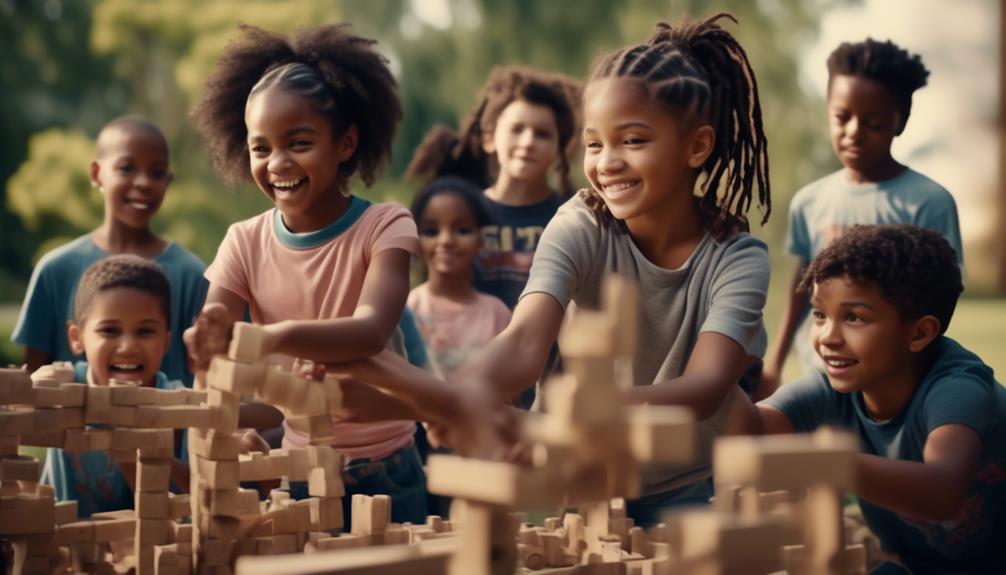Facilitating Peer Play to Boost Social Skills

Facilitating peer play can boost social skills and foster meaningful connections among children. This is achieved by encouraging communication, collaboration, empathy, and problem-solving in a positive and inclusive social environment.
By providing opportunities for children to interact with their peers, they learn how to effectively communicate their ideas, thoughts, and feelings. They also learn how to listen to others and take turns in conversations.
Collaboration is another important skill that is enhanced through peer play. Children learn how to work together, share responsibilities, and achieve common goals. This not only strengthens their social bonds but also teaches them the value of teamwork.
Empathy is a crucial aspect of social interaction, and peer play allows children to develop this skill. Through playing and interacting with their peers, children learn to understand and relate to others' emotions and perspectives. This helps them build meaningful connections and develop a sense of compassion and understanding towards others.
Problem-solving is another skill that is nurtured through peer play. Children encounter various challenges and conflicts during play, and they learn how to find solutions and resolve these issues in a constructive manner. This helps them develop critical thinking skills and become more independent problem solvers.
In conclusion, facilitating peer play provides children with numerous opportunities to develop and enhance their social skills. By encouraging communication, collaboration, empathy, and problem-solving, peer play creates a positive and inclusive social environment where children can forge meaningful connections with their peers.
Key Takeaways
- Peer play is essential for boosting social skills and fostering meaningful connections.
- Creating an inclusive environment and providing diverse play materials can set the stage for successful peer play.
- Encouraging communication, collaboration, and problem-solving activities can enhance peer play experiences.
- Promoting empathy, understanding, and conflict resolution skills are crucial in facilitating positive peer interactions.
Importance of Peer Play
Engaging in peer play is a vital component for developing social skills and fostering meaningful connections with others. The benefits of peer play are numerous and play a significant role in a child's social development.
When children interact with their peers in a playful setting, they learn valuable lessons about sharing, cooperation, and empathy.
One of the key benefits of peer play is the opportunity it provides for children to practice and refine their social skills. Through play, children learn how to communicate effectively, negotiate, and resolve conflicts in a safe and supportive environment. They learn to take turns, compromise, and respect the feelings and boundaries of others. These skills are essential for building healthy relationships and navigating social situations throughout life.
Furthermore, peer play promotes social development by encouraging children to develop a sense of belonging and connection with others. It gives them a chance to form friendships, develop trust, and build a support network. Through shared experiences and collaborative play, children develop a sense of empathy and learn to understand and appreciate different perspectives.
Setting the Stage for Peer Play
Creating the ideal environment is crucial for fostering successful peer play and promoting the development of social skills in children. By creating inclusive environments and fostering positive relationships, you can set the stage for peer play and enhance the social growth of children.
To create an inclusive environment, it's important to ensure that every child feels welcomed and valued. Provide a variety of play materials that cater to different interests and abilities, allowing each child to find something they enjoy. Encourage children to collaborate and work together, promoting teamwork and cooperation. Additionally, create a safe and nurturing space where children feel comfortable expressing themselves and taking risks.
Fostering positive relationships is essential for successful peer play. Encourage children to communicate and interact with one another, teaching them how to resolve conflicts peacefully and effectively. Model positive social behaviors and encourage empathy and understanding. By promoting kindness and respect, you can help children build meaningful relationships and develop important social skills.
Encouraging Communication and Collaboration
To foster effective peer play and promote the development of social skills, it's essential to encourage open communication and collaborative interactions among children. Encouraging active listening and fostering teamwork skills are crucial in creating an environment that nurtures communication and collaboration.
Active listening is a fundamental skill that allows children to understand and empathize with their peers. By encouraging active listening, you're teaching children to pay attention to others' perspectives, thoughts, and feelings. This helps them build stronger connections and develop a deeper understanding of their peers' emotions and needs.
Fostering teamwork skills is another vital aspect of promoting effective communication and collaboration. When children work together towards a common goal, they learn the importance of cooperation, compromise, and effective communication. By engaging in activities that require teamwork, such as group projects or team sports, you're providing opportunities for children to practice these skills and develop a sense of unity and shared responsibility.
Incorporating games and activities that require group discussions, problem-solving, and decision-making can also enhance communication and collaboration among children. Encourage them to express their opinions, listen to others' ideas, and work together to find solutions.
Promoting Empathy and Understanding
By fostering active listening and teamwork skills, you have already laid a strong foundation for promoting empathy and understanding among children. Now, let's delve deeper into the importance of empathy training and fostering social connections in order to enhance these essential skills.
- Cultivating Empathy: Encourage children to put themselves in others' shoes and understand their feelings and perspectives. Teach them to recognize and validate emotions, fostering a sense of empathy and compassion.
- Perspective-Taking Exercises: Engage children in activities that require them to see the world from different viewpoints. This helps develop their ability to understand and empathize with others' experiences, fostering a deeper sense of understanding.
- Promoting Cooperation: Encourage cooperative play and teamwork, emphasizing the importance of working together towards a common goal. This fosters empathy by teaching children to consider others' needs and collaborate effectively.
- Building Social Connections: Create opportunities for children to interact with diverse peers, promoting inclusivity and understanding. Encourage them to engage in conversations, ask questions, and actively listen to others, fostering empathy and building stronger social connections.
Managing Conflict and Problem-solving
Now, let's explore the crucial skills of managing conflict and problem-solving.
In order to navigate conflicts effectively, it's important to employ conflict resolution strategies that promote understanding and harmony.
Additionally, problem-solving techniques can help you tackle challenges and find creative solutions.
Furthermore, learning the art of mediation and compromise can enable you to find common ground and reach mutually beneficial outcomes.
Conflict Resolution Strategies
Developing effective conflict resolution strategies is essential for managing conflicts and problem-solving in social interactions. When conflicts arise during peer play, it's important to address them in a constructive and respectful manner. Here are four conflict resolution techniques that can help improve social skills and foster positive relationships:
- Active listening: Paying attention to others' perspectives and feelings promotes understanding and empathy.
- Problem-solving: Encouraging children to work together to find mutually beneficial solutions teaches them valuable skills in compromise and collaboration.
- I-messages: Using 'I' statements to express feelings and concerns helps avoid blame and encourages open communication.
- Taking turns: Teaching children to take turns during conflicts promotes fairness and helps them understand the importance of sharing and compromise.
Problem-Solving Techniques
To effectively manage conflicts and find solutions, it's important for you to employ problem-solving techniques that promote collaboration and mutual understanding.
Collaborative problem solving is a process that involves actively working together with others to identify and address a problem or conflict. By utilizing critical thinking skills, you can approach problems in a systematic and logical manner, considering multiple perspectives and potential solutions.
This approach encourages open communication, active listening, and the ability to generate creative solutions. When faced with a conflict, take the time to gather information, analyze the situation, and identify the underlying causes.
Encourage everyone involved to share their thoughts and ideas, and work together to find a solution that's fair and beneficial for all parties. Remember, effective problem-solving requires a willingness to compromise and a commitment to finding common ground.
Mediation and Compromise
When managing conflicts and problem-solving, mediation and compromise play crucial roles in finding mutually beneficial solutions. Here are four essential techniques to help you navigate through conflicts and reach compromises:
- Active Listening: Practice active listening to understand the concerns and perspectives of all parties involved. By giving your full attention and showing empathy, you create a safe space for open communication.
- Finding Common Ground: Look for areas of agreement or shared interests between the conflicting parties. Identifying common ground can serve as a starting point for finding a compromise that satisfies everyone's needs.
- Collaboration: Encourage collaboration by involving all parties in the problem-solving process. By working together, you can generate creative solutions that address the underlying issues and promote mutual understanding.
- Flexibility: Be open to flexible solutions that may require some give-and-take. Compromising involves finding middle ground and being willing to make concessions for the greater good.
Providing Structured Play Opportunities
Now let's explore the importance of providing structured play opportunities for boosting social skills.
Guided play, where adults provide gentle guidance and support, can be an effective way to encourage socialization among children.
Guided Play for Socialization
Structured play opportunities can greatly enhance socialization skills, fostering growth and development in individuals of all ages. Here are four reasons why guided play can be effective in promoting social development:
- Clear objectives: Structured activities provide a framework for interaction, allowing individuals to understand the purpose of the play and engage in meaningful social exchanges.
- Role modeling: Guided play offers opportunities for individuals to observe and imitate positive social behaviors, such as taking turns, sharing, and cooperating, which can lead to improved social skills.
- Conflict resolution: Through guided play, individuals learn how to navigate conflicts and solve problems in a supportive and controlled environment. This helps develop their ability to negotiate, compromise, and communicate effectively.
- Building relationships: Structured play provides a platform for individuals to connect with others who've similar interests, facilitating the formation of friendships and fostering a sense of belonging.
Structured Games for Interaction
Incorporating structured games into your playtime can provide engaging opportunities for interaction and social development. These games are carefully designed to create a structured environment that encourages social interaction and enhances social skills.
By participating in these games, you can learn important social cues, develop communication skills, and practice cooperation and teamwork. Structured games provide a clear set of rules and objectives, which helps to guide your interactions with others and fosters a sense of fairness and respect.
These games also offer a safe space to practice conflict resolution, problem-solving, and decision-making skills. Whether it's a board game, a team sport, or an interactive group activity, structured games can be a fun and effective way to improve your social skills while enjoying the company of others.
Supporting Peer Play in Different Environments
To create an inclusive and engaging environment for peer play, consider embracing diverse settings that foster a sense of collaboration and exploration. Whether it's outdoor play or virtual play, providing opportunities for children to interact in different environments can greatly enhance their social skills.
Here are four ways you can support peer play in various settings:
- Outdoor Playgrounds: Encourage children to engage in imaginative play on outdoor playgrounds. These spaces offer opportunities for physical activity, problem-solving, and social interaction. Children can learn to take turns on the swings, negotiate rules in a game of tag, and cooperate on climbing structures. The open space also allows for creative exploration and the development of gross motor skills.
- Virtual Play Platforms: With the rise of technology, virtual play has become increasingly popular. Online gaming platforms provide children with opportunities to connect with peers from different parts of the world. Through teamwork and communication, they can solve puzzles, complete quests, and engage in cooperative play. Virtual play platforms also allow children with limited mobility to participate and interact with others.
- Community Centers: Community centers offer a variety of programs and activities that promote socialization among children. From art classes to sports teams, these environments encourage collaboration and friendship-building. Children can learn to work together on projects, develop empathy through shared experiences, and broaden their social circles.
- School Settings: Schools provide structured environments where children can engage in peer play. Classroom activities, group projects, and recess time all offer opportunities for social interaction. Teachers can facilitate peer play by creating inclusive environments, promoting positive communication, and teaching conflict resolution skills.
Frequently Asked Questions
How Can Peer Play Help Children Develop Their Social Skills?
Peer play can greatly benefit children's social skills. By engaging in cooperative play, they learn the importance of turn taking and develop valuable communication and problem-solving abilities. It's a fun and effective way to enhance their social interactions.
What Are Some Strategies for Creating an Inclusive and Supportive Environment for Peer Play?
To create an inclusive and supportive environment for peer play, focus on creating play spaces where everyone feels welcome. Promote positive social interactions by encouraging kindness, cooperation, and empathy among children.
How Can Parents and Educators Encourage Effective Communication and Collaboration During Peer Play?
To encourage effective communication and collaboration during peer play, you can foster problem-solving skills by providing opportunities for active participation. Encourage children to work together, listen to each other, and find solutions as a team.
What Are Some Activities or Games That Can Be Used to Promote Empathy and Understanding Among Children During Peer Play?
To promote empathy and understanding among children during peer play, try incorporating play activities like role-playing, where they can step into someone else's shoes, or empathy-building games that encourage them to consider others' feelings.
How Can Conflicts and Problems That Arise During Peer Play Be Effectively Managed and Resolved?
To effectively manage and resolve conflicts that arise during peer play, focus on developing problem-solving skills. Encourage open communication, active listening, and empathy. Teach children to find compromises and work together towards a solution.










